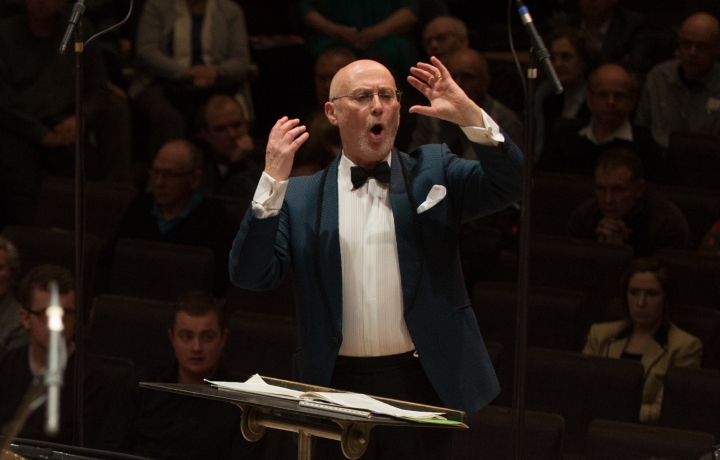Let's Debate with Howard Snell

Conductor, composer, arranger, player and educator, Howard Snell, recently rekindled his love affair with brass bands by leading Bjørsvik Band at the Norwegian National. Here he gives his views about what has changed since he was last immersed in the brass band culture
When I said “goodbye!” to contesting and regular band conducting some years back, I had no idea whether it would be temporary or permanent. I just felt in need of a change. So when I recently teamed up with Bjørsvik - the Eikanger reunion band that meets irregularly and plays for fun - to take it to the Norwegian National, I was asked by the Editor of BBW to put down my thoughts on how, if at all, banding had changed in the intervening period.
In everyday life, the Internet grew more and more commonplace and a large part of the population became surgically attached to a variety of electronic devices, which required them to walk about head down, looking glum. Banding magazines carried polls that showed almost no one listened to any music other than pop, so not a surprise that classical dropped to three per cent of recording sales.
As for actual banding life throughout this period, the British Brass Band Federation was finally pronounced a dead ex-duck and buried without a further quack, while Brass Bands England very, very quietly was born and was christened by whoever were its parents with a very, very awkward name and with what looked like a dead narrow-bore euphonium as its logo. Band programmes for the public gradually cut out almost all music composed specifically for brass bands, music that is now increasingly squeezed into festivals and special events for the faithful. Bands continued to recruit more and more women players, which causes me some amusement when I remember the fuss made by other ‘top bands’ when I introduced Carole Crompton as first baritone in Desford Band, in the ‘80s. How the foundations shook for all of five minutes! I just wanted the best player and Carole was it.
So what do I think of British banding after these years of absence? In general, I think it is fantastic. It’s still thrilling. Banding is an activity that renews itself naturally: people belong to it because they want to, not because they have to or feel they should. It is vibrant because it has such a high value for so many people. Banding is about players and playing an instrument, from the bottom to the top. Everything else fits around that. So all perfect? Not quite. I’ll mention a couple of things later.
On the supporting side, a very large number of people still continue to give enormous amounts of selfless service to banding’s day-to-day needs. On the performing front, standards continue to rise and, in particular Welsh banding continues its significant ascent. I love the realism in banding: if you perform well, you move up. If you perform poorly, then you move on or down. How refreshing. I have yet to hear any PC nonsense in banding that such and such band should be allowed to win occasionally because it has not ever won anything. Not at all like the UK’s current life, controlled by dictatorial public ‘servants’ with their quangos and quotas, targets and guidelines, their sermons about what to eat and drink, and how to behave, with bullying clichés about diversity and multiculturalism. Banding seems to me to be open to everyone: it has so many lessons to teach the world, lessons that have been forgotten or corrupted by know-all social engineers. Now we have an increasing number of women conductors. Good. There’s been no rioting in the streets.
In musical education, a few bands are now filling some of the disgraceful gaps left by central government in England. The ignorance of the present government, in not including music in their list of core subjects, is beyond description. It is not just a matter of the value of the music itself: banding is just as valuable as a vehicle for social cohesion, for teaching hard work, for the taking of knocks, and the learning of teamwork and leadership. The passing on of knowledge and know-how is the bedrock activity of any stable society and banding does this, and does it very well. It does this by being at the same time thrilling, enjoyable, satisfying and educative... all different positives that mesh together to create firm, purposeful minds.
I recently suggested a long-held view of mine to some banding colleagues; that research into anti-social behaviour and minor crime among young people would reveal a significant benefit for those involved in ensemble musical activity from childhood onwards. I am hopeful that this will go forwards as a research project at a significant level.
Banding can then be added to the worldwide mountain of research that proves the benefits of musical activity for the young... and why not the old as well... or even that very unconsidered group in the modern world, the middle-aged?
One negative here: why do most top section bands, with just a few notable exceptions, fail to undertake consistent youth development? Top section banding has a permanent and less than honourable debt to all youth and Lower Section bands, which are of course the main seedbeds of young talent. The poachers move in like thieves in the night, without a backwards glance or a seeming pang of conscience about recognising who exactly has done the hard yards of training and nurturing of the young. At the least some significant financial recognition should flow to those lesser bands that are, in truth, just as important to banding as the glamour pusses of the top section.
So what was the problem I mentioned earlier? It’s the...
To read this fascinating article in full, and much more from March's edition of BBW, subscribe to BBW Digital here. 10 editions throughout the year for only £30!





.gif)







